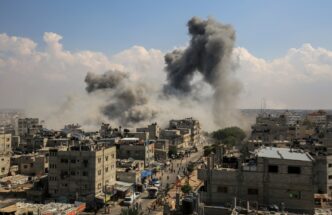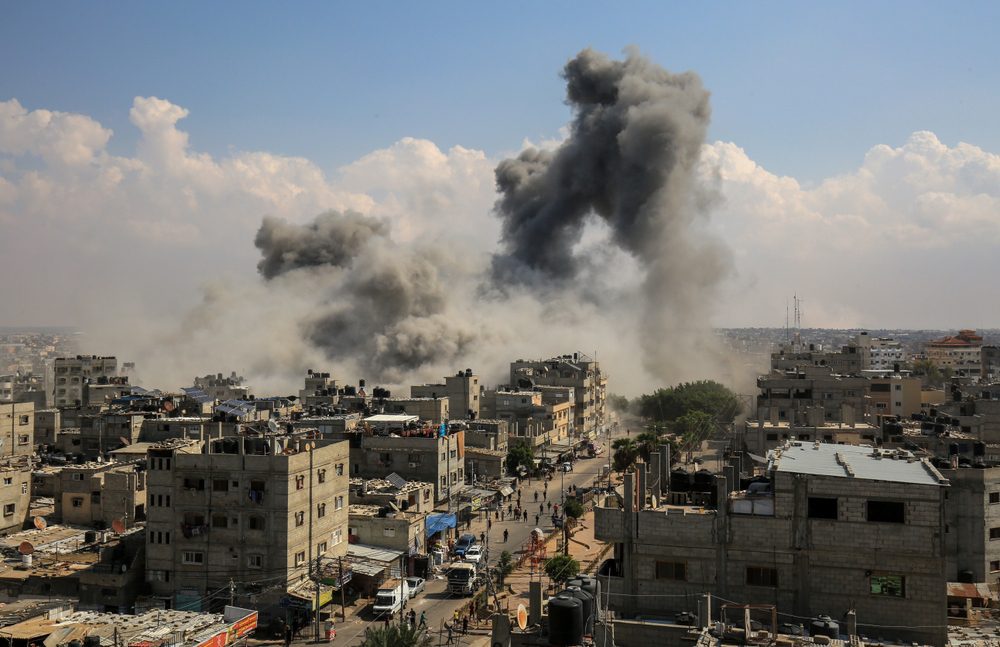Executive Summary
The Story So Far
Why This Matters
Who Thinks What?
The Israeli army has launched a ground operation into Gaza City, prompting strong international condemnation and a move by the European Union to consider initial economic sanctions against Tel Aviv. This escalation follows intense aerial bombardments, with the UN Office for the Coordination of Humanitarian Affairs (OCHA) warning of a “dangerous escalation” and an independent UN Commission of Inquiry alleging that Israel is committing genocide in Gaza.
Gaza City Under Siege
Gaza City, previously the most populous urban center in the Strip, had become a refuge for nearly one million people after an estimated 70 percent of buildings in the northern Palestinian enclave were reportedly razed by Israeli forces. The UN OCHA had previously highlighted that these individuals were left without safe or viable options, asserting that neither the north nor the south offered security.
While Israel stated that 40 percent of the inhabitants had evacuated the city in anticipation of the operation, approximately half a million people are estimated to remain. The Israeli army claims that “between two and three thousand” Hamas militants are hiding within Gaza City, along with Israeli hostages still held by the group.
Israeli Foreign Minister Israel Katz declared that if Hamas does not release the hostages, “the Strip will be destroyed.” Al Jazeera has reported at least 68 fatalities in Gaza City since the morning of the operation, and families of Israeli hostages have reportedly declared a “state of emergency” regarding the offensive, establishing an encampment outside Prime Minister Netanyahu’s residence.
EU’s Evolving Stance
The European Union, facing accusations of complicity amidst the escalating conflict, is preparing to introduce its first political and economic measures against Israel. EU Crisis Management Commissioner Hadja Lahbib emphasized on X that “the protection of civilians and respect for international humanitarian law must remain our compass” as Israel intensifies operations.
Brussels previously reached an agreement with Israel on civilian protection and humanitarian aid, an understanding that has reportedly had little effect given the current situation. Anouar El Anouni, spokesperson for the European Commission, noted the ongoing evaluation of its effects, acknowledging the complexity of implementation “in a context of war.”
Proposed Sanctions Package
Following growing public indignation, European Commission President Ursula von der Leyen announced efforts to increase pressure on the Israeli government. The Commission has confirmed it will adopt a proposal to suspend approximately €30 million in bilateral support to Israel.
Additionally, the Commission plans to propose the suspension of certain trade provisions within the EU-Israel Association Agreement, a measure requiring the support of two-thirds of member states. A further proposal aims to sanction specific ministers within Prime Minister Netanyahu’s government, which would necessitate the unanimous approval of all 27 EU member states.
International Condemnation and Genocide Allegations
Israel has reportedly remained unresponsive to calls from the European Union, the United Nations, and the broader international community. The EU’s El Anouni reiterated the bloc’s warnings against escalating operations in Gaza City, stating it “will lead to further destruction, deaths, and displacement, exacerbating the already catastrophic humanitarian situation and endangering the lives of hostages.”
Statements from other European capitals include London’s description of the offensive as “totally irresponsible and appalling,” while Berlin called it “completely wrong.”
In a significant development, an independent UN Commission of Inquiry concluded that Israel is committing genocide in Gaza with the “intent to destroy the Palestinians.” The commission, led by Navi Pillay, also attributed responsibility for “incitement to genocide” to Prime Minister Netanyahu, President Isaac Herzog, and former Defence Minister Yoav Gallant. Israel has rejected these findings, accusing the UN experts of acting as “Hamas’ representatives.”
Key Takeaways
The Israeli ground operation in Gaza City marks a critical escalation in the conflict, intensifying the humanitarian crisis and drawing severe international criticism. The European Union’s move towards potential economic sanctions reflects a shifting stance, while the UN’s grave allegations of genocide underscore the profound concerns surrounding the ongoing hostilities.








